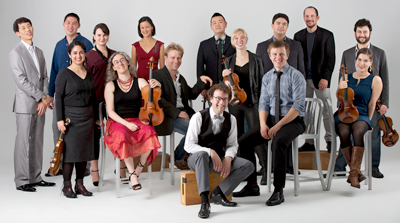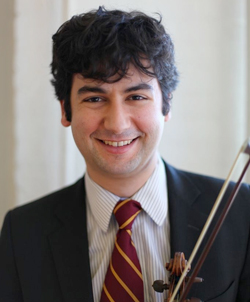by Daniel Hathaway

The ensemble of string players, who perform without conductor, share all aspects of decision-making among the membership, a process the orchestra will discuss with BW students and faculty during its sojourn later this week.
The musical results of their approach to self-governance will be on display in a 7:00 pm concert on Tuesday, January 24 in Gamble Auditorium. The program will include J.S. Bach’s Double Violin Concerto, Lembit Beecher’s The Conference of the Birds, Arvo Pärt’s Tabula Rasa, and selections from the medieval Codex Calixtinus. Violinists Jae Cosmos Lee and Megumi Stohs Lewis will be featured in the Bach, while Alex Fortes and Miki-Sophia Cloud will be violin soloists for the Pärt.
We reached Alex Fortes outside Jordan Hall last weekend just before the “Criers” (as they call themselves) began their dress rehearsal for the Boston edition of the concert program. Alex, who graduated from Harvard in 2007, regards himself as one of the newer members of the orchestra, having joined in 2012, but he was prepped for A Far Cry’s philosophy by playing with the Brattle Street Chamber Players in Cambridge, a chamber orchestra that also espoused democratic musical values. He said the Harvard music department tended to be so academic that vibrant, student-generated musical activities flourished.

Alex Fortes: It all started with a conversation with Lembit Beecher. We talk a lot about process — how to incorporate 17 to 19 opinions equitably. A lot of the conversations take place during twice-yearly retreats where we discuss how to structure rehearsals to allow every member of the group to contribute everything they can without feeling like there’s any kind of fixed hierarchy.
This program started out as a way of musically exploring these concepts. Lembit was very interested in a 12th-century Sufi poem about a large group of birds who go off on an ill-fated quest in search of a leader. Many of them die along the way, and finally, only 30 are left to gaze into a lake to see the image of their leader — but all they see is their own reflections. That seemed like an interesting story to use to create a piece about the pitfalls of leadership and collaboration.
DH: Do the other works resonate with that theme?
AF: Every other part of the program is built around that in some way. The concertos are for two violins, so at some point, everybody is playing ‘second fiddle’ — and in the Bach, a lot of the leadership role comes from the continuo. Tabula Rasa is very spiritual without the purpose-filled narrative you often find in concertos. Instead, there’s quite a bit of stasis. While the solo parts are virtuosic, they’re not always separate from the texture.
Another thing that interests me about the program is that it features extra-musical elements of all sorts — transcribing 12th-century music, exploring social psychology and literature — that make it very amenable to an academic institutional residency like at Baldwin Wallace.
DH: It must require quite a bit of rehearsal time to settle all the ensemble issues.
AF: The real challenge is focus and concentration, even if you’re playing only one note for a very long time.
DH: What especially appeals to you about A Far Cry?
AF: Everything you do is magnified by having 17 people who are receptive and committed to what are occasionally wild and ambitious ideas. Instead of reverting to the mean, there is a commitment by the group to seeing how to make crazy ideas happen. I’ve had incredible learning experiences that have turned into very interesting artistic ventures.

DH: How did The Conference of the Birds come about?
Lembit Beecher: I wanted to write a piece for the Criers’ individual personalities — 18 solo parts — rather than for sections of the orchestra. The composing process was a mix of writing with individuals in mind and letting the parts acquire their own personalities by allowing them to take me in a certain direction. Everyone in the ensemble has a very distinct personality and manner of playing. Some play with a Romantic intensity, others more like period players. The piece includes solos and sections where people can put their own stamp on the texture, especially in the second movement. I gave them some direction, but asked them to play with their own character.
DH: Were you present during the rehearsals?
LB: I was involved in all the rehearsals. The players were really open to that because they rehearse in such a collaborative way, balancing all the different voices in the room democratically.
DH: And will you be coming to Baldwin Wallace with the ensemble?
LB: I will. I’ll be teaching some lessons and be involved in career and management discussions. And I’m looking forward to working with Clint Needham.
DH: Congratulations on your recent appointment as a composer in residence for the St. Paul Chamber Orchestra. What will your duties look like?
LB: New Music USA — who gave the grant with Mellon Foundation money — was really interested in enabling deeper connections between composers and orchestras, so they funded five residency pairs of composers and orchestras. Part of the job is what you’d expect, and St. Paul will commission a big piece for the end of the residency, but I’ll be part of the artistic decision-making process. The Orchestra is moving a bit in the direction of A Far Cry, though not so extreme. They’re interested in micro-commissioning projects that come from the players themselves, so I’ll be the go-between or advisor for developing projects involving storytelling, mixing media, and documentary techniques.
DH: I asked Alex about his musical life as an undergrad at Harvard. How was that experience for you?
LB: That was interesting. I had been a pianist, and almost went to Oberlin for a double degree, but I kept asking people about writing music — I don’t think I wanted to practice enough to be a pianist. My first formal training came near the end of my time in Cambridge. But Harvard was a great place to be a musician — I had a lot of conducting and playing opportunities I wouldn’t have gotten at a conservatory, where there would have been ‘real’ conductors. The faculty was somewhat on the old school side, but I worked with three great teachers: Bernard Rands, Mario Davidovsky, and Kurt Stallmann (who had just gotten his doctorate — I later followed him to Rice). It was a little bit removed from the Bang on a Can world, for better or for worse. But I found that in the end I loved making things more than analyzing things.
Published on ClevelandClassical.com January 17, 2017.
Click here for a printable copy of this article


